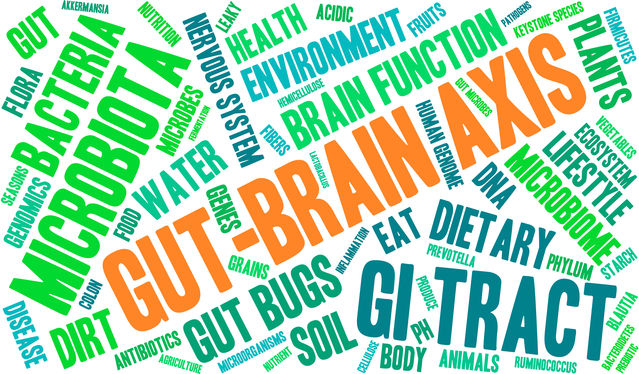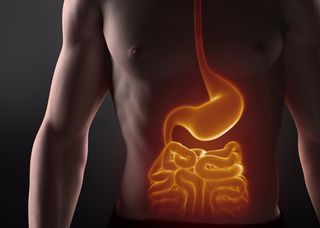Vagus Nerve
Psychotherapy Can Dramatically Improve Your "Gut-Brain Axis"
A new meta-analysis reports that psychotherapy benefits the "gut-brain axis."
Posted January 5, 2016

There have been a lot of research breakthroughs surrounding the “gut-brain axis" recently. In 2012, researchers from Ireland discovered that brain levels of serotonin are regulated by the amount of healthy bacteria in the gut during early life. The researchers found that normal adult brain function depends on the presence of healthy gut microbes during childhood development. The study was published in the journal Molecular Psychiatry.
Serotonin is a complex neurotransmitter and hormone that regulates mood and emotions. In humans, over 90% of serotonin is produced in the GI tract of the intestines. Low levels of serotonin are known to play a role in depression and anxiety, which is why SSRI antidepressants target serotonin reuptake in the brain. Altered levels of peripheral serotonin have also been linked to diseases such as irritable bowel syndrome (IBS).
IBS is a gastrointestinal disorder that is characterized by abdominal pain, bloating, diarrhea, or constipation. It's technically classified as a disorder of the "gut-brain axis." IBS affects approximately 7-16 percent of the U.S. population. The annual healthcare costs of IBS are estimated at somewhere between $950 million to $1.35 billion. Although there isn’t a known cure for IBS, psychological interventions have proven effective for reducing symptoms.
A 2015 study, "Indigenous Bacteria from the Gut Microbiota Regulate Host Serotonin Biosynthesis," published in the journal Cell, examined how certain metabolites from gut microbes promote serotonin production in the cells lining the colon. The study was led by Elaine Hsiao, a biologist now at UCLA. In a press release, Hsiao described the research saying,
"More and more studies are showing that mice or other model organisms with changes in their gut microbes exhibit altered behaviors. We are interested in how microbes communicate with the nervous system.
To start, we explored the idea that normal gut microbes could influence levels of neurotransmitters in their hosts. Serotonin is an important neurotransmitter and hormone that is involved in a variety of biological processes. The finding that gut microbes modulate serotonin levels raises the interesting prospect of using them to drive changes in biology.”
Psychological Therapy Can Reduce IBS Symptoms
A new meta-analysis study from Vanderbilt University reports that entering the "gut-brain axis" from the top-down, by using psychotherapy to reduce the symptoms of IBS, is effective in both the short- and long-term. Although this analysis doesn't look specifically at microbiome or serotonin levels in the gut, an educated guess is that psychotherapy improves the robustness of healthy microbes in the digestive tract.
The December 2015 report, “Short- and Long- Term Efficacy of Psychological Therapies for Irritable Bowel Syndrome: A Systematic Review and Meta-Analysis," was published online by the journal Clinical Gastroenterology and Hepatology.

The researchers analyzed the results of 41 clinical trials from a number of different countries containing more than 2,200 patients. The beneficial effects of psychological therapy appear to last at least six to 12 months after the therapy had concluded. The average individual assigned to psychotherapy experienced a greater decrease in GI symptoms than 75% of individuals assigned to a control condition.
In a press release, first author Kelsey T. Laird, a doctoral student in Vanderbilt's clinical psychology program, said,
"Western medicine often conceptualizes the mind as separate from the body, but IBS is a perfect example of how the two are connected. Gastrointestinal symptoms can increase stress and anxiety, which can increase the severity of the symptoms.
This is a vicious cycle that psychological treatment can help break. In this study we looked at the effect of psychological therapies on gastrointestinal symptoms. In a follow-up study I am investigating the effect that they have on patients' ability to function: go to work, go to school, participate in social activities and so on."
The Vagus Nerve Plays a Vital Role in the “Gut-Brain Axis”
In 2014, I wrote a Psychology Today blog post, “How Does the Vagus Nerve Convey Gut Instincts to the Brain?" based on findings by researchers in Switzerland who identified how the vagus nerve conveys “gut feelings” of anxiety and fear to the brain.
The vagus nerve is known as the "wandering nerve" because it has multiple branches that diverge from two thick stems rooted in the cerebellum and brainstem that wander to the lowest viscera of your abdomen touching your heart and most major organs along the way. Vagus means "wandering" in Latin. The words vagabond, vague, and vagrant are all derived from the same Latin root.
Although none of the recent "gut-brain axis" research I’ve read discusses the role of the vagus nerve, I have a hunch that the vagus nerve is a central player in communicating messages between the brain and the gut. Hopefully, future research on the benefits of psychotherapy and GI health will investigate the role of the vagus nerve in depth.
Conclusion: Psychotherapy Reduces IBS Symptoms in the Short- and Long-Term
The new meta-analysis from Vanderbilt University verifies that psychological therapy can reduce GI symptoms in adults with IBS. The benefits of psychotherapy for improving the “gut-brain axis” are significant in both the short- and long-term.
For this meta-analysis, Kelsey Laird analyzed a wide range of different types of psychological therapies including: cognitive therapies, relaxation, and hypnosis. Laird's meta-analysis found that all the different types of psychotherapy had GI benefits and reduced IBS symptoms.
If you'd like to read a comprehensive review of the latest research on the "gut-brain axis," check out this October 2015 Nature article, "The Tantalizing Links Between Gut Microbes and the Brain," by Peter Audrey Smith.
© 2016 Christopher Bergland. All rights reserved.
Follow me on Twitter @ckbergland for updates on The Athlete’s Way blog posts.
The Athlete’s Way ® is a registered trademark of Christopher Bergland.




